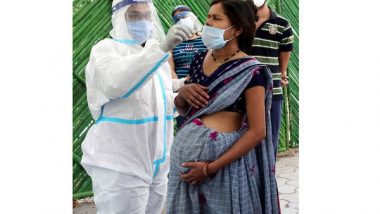New Delhi [India], July 26 (ANI): COVID-19 positive mothers can continue to breastfeed their babies but are advised to keep them at a distance of six feet from themselves, according to a new advisory issued by the Union Health Ministry.
It also said that an overall health check-up post-Covid recovery must be carried out in pregnant women to ensure that the mother and the foetus are doing fine
An interview of Dr Manju Puri, Head of the Department Obstetrics and Gynaecology in Lady Hardinge Medical College, released by the ministry said that during the second wave, many women contracted COVID-19 during pregnancy compared to the first wave.
"COVID if severe can lead to serious complications during pregnancy, especially during the last trimester as the uterus is enlarged and presses on the diaphragm, compromising a woman's ability to cope with a fall in oxygen saturation. This may lead to a sudden fall in blood oxygen saturation and risk the lives of both the mother and the child. Vaccines will help prevent severe diseases in pregnant women," Dr Puri said.
It has now been approved that women can take COVID-19 vaccines even during pregnancy.
"Vaccines help the body develop immunity against a specific pathogen, it does not affect any other body tissue. We recommend an overall health check-up post-Covid recovery to ensure that the mother and the foetus are doing fine," Dr Puri said.
"Also, vaccinating a mother is likely to give some degree of protection to the newborn as the antibodies developed in the mother's body post-vaccination will pass on to the developing foetus through her blood. In the case of lactating mothers, an infant gets these antibodies through the mother's breast milk," the expert pointed out.
Breaking the rumours about vaccines causing infertility among women, she said, "These are rumours that get circulated on ubiquitous social media. Misinformation is far more dangerous than the virus itself. Though the Covid-19 vaccines are relatively new, these have been developed using time tested techniques. Vaccines help the body develop immunity against a specific pathogen, it does not affect any other body tissue. In fact, we give some vaccines such as hepatitis B, Influenza, pertussis vaccine to women even during pregnancy to protect them and their unborn child from various diseases."
Besides, regulators have approved the administration of the vaccines during pregnancy only after they were confident of their safety. There is no scientific data or studies that show that vaccines can cause infertility. These vaccines do not affect the reproductive organs in any way.
Talking about precautions a pregnant woman should take to protect herself from COVID, she suggested an expectant mother wear a mask and maintain physical distance following all the Covid-Appropriate precautions among family members.
On getting early symptoms of COVID, she suggested getting themselves tested. The management of COVID is almost the same during the pregnancy as it is for others, but it should be done only under the strict supervision of a doctor. A woman should isolate herself, drink plenty of fluids. Should check her temperature and oxygen saturation every four to six hours.
Besides, women who have associated illnesses such as diabetes, high blood pressure, cardiovascular disease, obesity needs to be more careful as they may need hospitalisation.
"A mother should continue to breastfeed the baby but is advised to keep the baby at a distance of six feet from her when she is not breastfeeding. A caregiver who is tested negative can also help in taking care of the newborn. Before breastfeeding the newborn, she should wash her hands, wear protective gear such as a mask or a face shield. She should also sanitize her surroundings frequently," said Dr Puri while talking about the precautions a COVID positive mother should take to protect her newborn.
"If there is no one else to take care of the child, a mother should wear a mask all the time, and maintain physical distance from the child as much as possible. The mother and the child should stay in a well-ventilated room. And she should regularly wash her hands and sanitise the surroundings," she further added.
Dr Puri while talking about postpartum depression and anxiety, she said that there is an increase in mental health problems among women during pregnancy and post-childbirth. These are times when a woman undergoes a lot of hormonal and physiological changes. She has poor coping skills and needs social support. In the absence of this social support, she can feel lonely, helpless, and depressed.
Isolation for 15-days is difficult for everyone, but more so for pregnant women and postnatal mothers. During this time, the additional anxiety about her child's health can severely affect her mental status.
So, it is important to provide constant support and assurance to women during this time. The family should stay in touch through video calls, and observe any change in her mood and seek medical help if she looks and feels depressed.
Talking about having symptoms suggestive of COVID such as fever, sore throat, loss of taste or smell or exposure to a COVID positive person, it is suggested that they need to seek medical help immediately and should not delay the diagnosis and should not self-treat.
Dr Puri counselled all pregnant women about various contraceptive methods during pregnancy and offer them postpartum Intra-Uterine Device (IUD), which can be inserted immediately after childbirth or caesarean delivery. It saves them of an unnecessary visit to the hospital after childbirth and reduces the risk of an unplanned pregnancy. (ANI)
(The above story is verified and authored by ANI staff, ANI is South Asia's leading multimedia news agency with over 100 bureaus in India, South Asia and across the globe. ANI brings the latest news on Politics and Current Affairs in India & around the World, Sports, Health, Fitness, Entertainment, & News. The views appearing in the above post do not reflect the opinions of LatestLY)













 Quickly
Quickly


